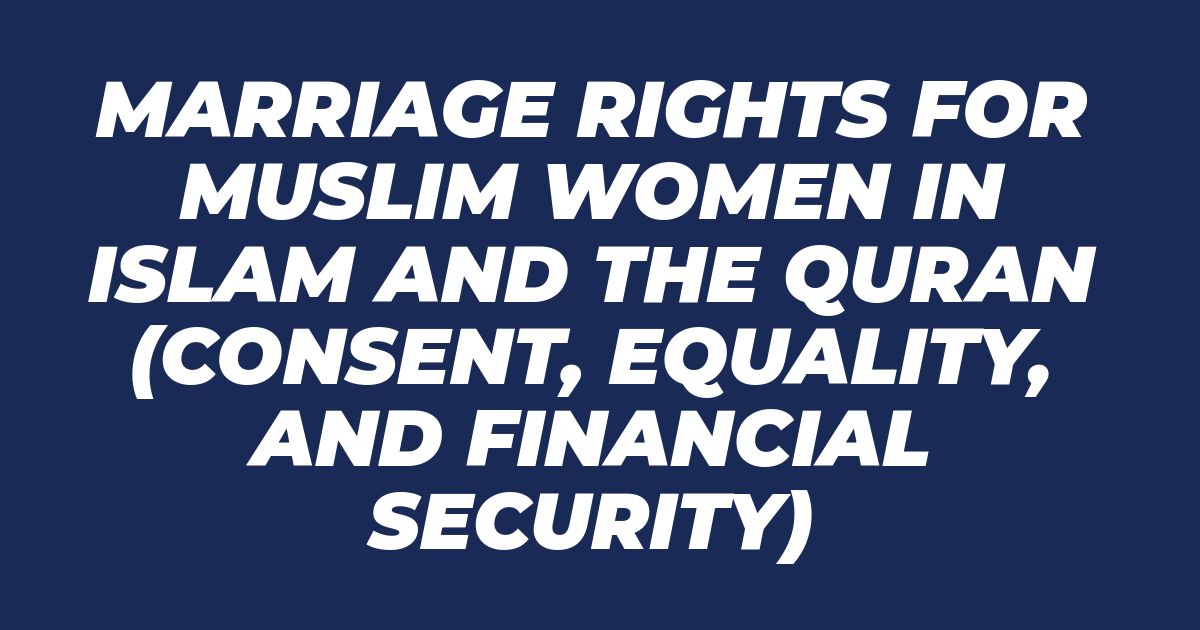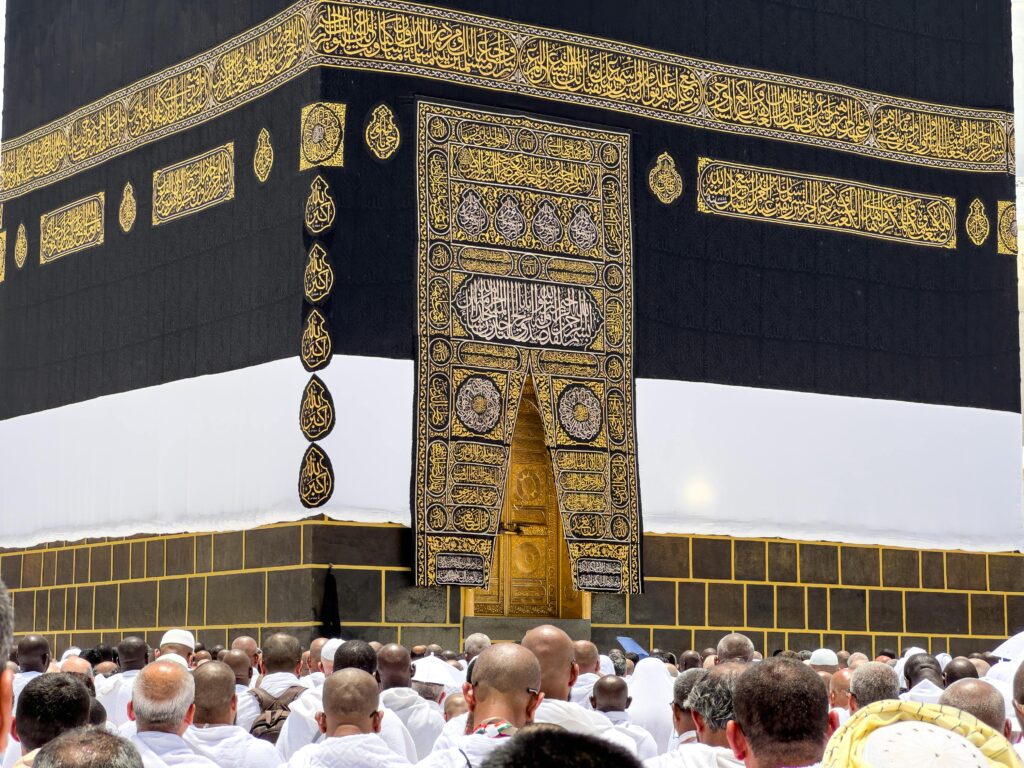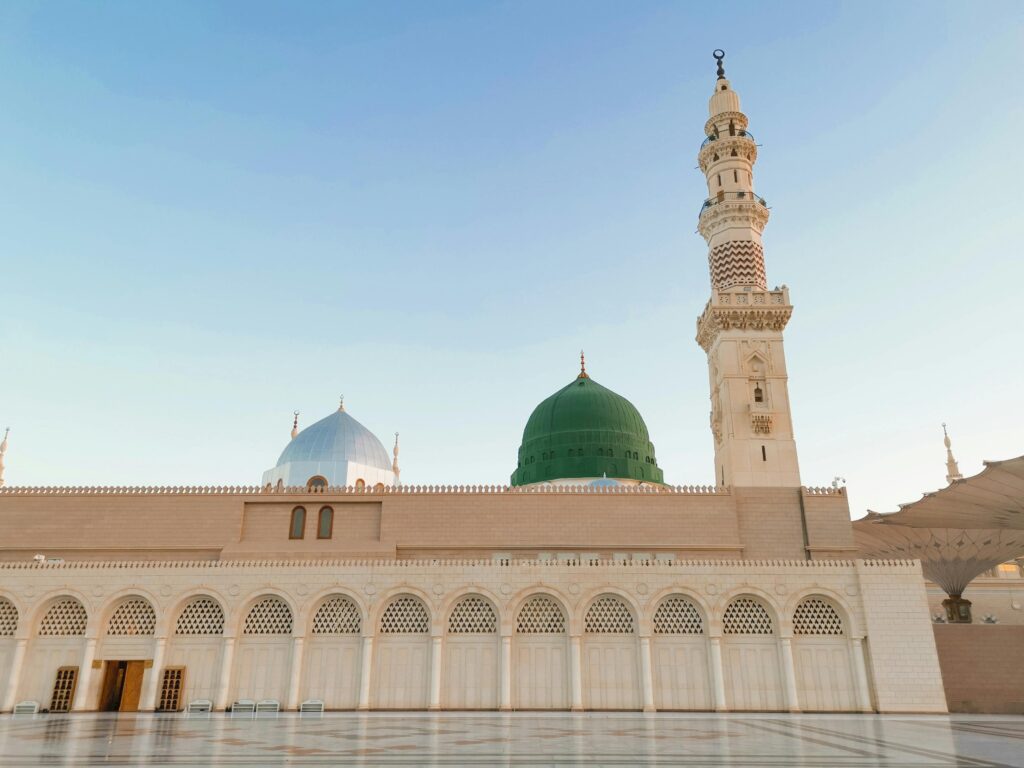Marriage Rights for Muslim Women in Islam and the Quran (Consent, Equality, and Financial Security)
Marriage rights for Muslim women are at the heart of many family discussions today. With changing times, many people wonder what the Quran actually says about these rights. The Quran outlines clear rules about consent, financial security, and fair treatment for women in marriage. Still, some of these teachings get misunderstood or overlooked.
Understanding these principles helps couples build more equal and peaceful homes. When women and men know their rights and duties, marriage becomes more than just a tradition—it’s a real partnership. Knowing what Islam teaches on this topic matters now more than ever, as families seek balance and respect in their everyday lives.
For a helpful video discussion, check out The Rights Of A WIFE In Islam | Belal Assaad.
Quranic Foundations of Marriage Rights
The Quran sets clear ground rules for marriage, making respect, compassion, and fairness the backbone of the relationship. Instead of seeing marriage only as a contract or a family event, the Quran says marriage is a sacred bond built on love and trust. These foundations protect both partners and give women a voice that cannot be ignored. At its core, marriage in Islam should bring out the best in both people, encouraging growth and kindness in daily life. Let’s look at how the Quran describes the purpose of marriage, and how it gives men and women equal spiritual standing.
Purpose of Marriage in the Quran
Marriage is not just about sharing a home or raising a family. According to the Quran, its deeper purpose is to create companionship, comfort, and mercy between spouses. Allah calls marriage a sign of His wisdom, where love and tranquility should be at the heart of the relationship.
A key verse in the Quran captures this:
- “And among His signs is that He created for you spouses from among yourselves so that you may find tranquility in them. And He has placed between you affection and mercy.” (Quran 30:21)
This passage highlights three core aims of marriage:
- Companionship: Spouses become sources of comfort to each other.
- Tranquility: Marriage is meant to create a safe and peaceful space.
- Mercy and kindness: Each partner is expected to treat the other with deep care and respect.
Other verses also stress the role of marriage in partnership and procreation, where both partners take part in nurturing children and supporting each other morally, emotionally, and physically. These values make marriage a supportive, loving union that aligns with Islamic teachings. For more on this perspective, the article on Marriage in Islam: A Sacred Bond of Love and Responsibility offers further reflections.
Equality and Dignity
The Quran rejects any idea that women have less value or fewer spiritual rights than men. Both are seen as equal believers with responsibilities and dignity in marriage. Any practice that puts down or mistreats women goes against Quranic principles.
Marriage in Islam is about harmony, not control. The Quran says:
- “And for women are rights over men similar to those of men over women in kindness.” (Quran 2:228)
It’s a two-way street where both partners have rights, and both are expected to support and respect one another. Key principles include:
- Equal spiritual standing: Men and women are both responsible for their faith and actions.
- Shared dignity: No one can be humiliated, dismissed, or treated unfairly in a marriage.
- Protection from harm: The Quran strictly opposes abuse or injustice. A marriage must not compromise a woman’s honor or safety.
For a look at Muslim wives’ rights as laid out in the faith, check out Understanding the Rights of a Muslim Wife. This balance of rights and duties stands as a standard, not just for legal fairness, but for earning Allah’s pleasure and building healthy families.
Both partners, then, need to show kindness, patience, and cooperation every day. Their marriage should be a shelter, not a battlefield, living up to the standards spelled out in the Quran.
Consent and Choice in Marriage
Consent sits at the heart of marriage in Islam. The freedom to say yes—or no—defines a woman’s dignity and power within the marriage process. The Quran and Sunnah stress that marriage is not valid without free and clear agreement from both partners. Women have the recognized right to make their own decisions about marriage, and family or social pressure should never stand in for true consent. This section breaks down why a woman’s consent matters and the role of the guardian (wali) in protecting rather than restricting her choice.
Free Consent as a Legal Requirement
The Quran makes clear that forced marriage has no place in an Islamic household. Consent is not just a formality; it is a legal and spiritual foundation. A marriage without a woman’s open agreement is seen as invalid in most scholarly opinions.
Islamic scholars point to evidence in both the Quran and hadith (sayings of Prophet Muhammad) that support this:
- The Prophet Muhammad directly addressed forced marriage, stating, “A previously married woman has more right to her person than her guardian, and a virgin should also be asked for her consent; her consent being her silence (due to shyness).” (Sahih Muslim)
- Several verses emphasize kindness and fairness, which cannot exist if a woman’s consent is ignored.
Legal schools in Islam are united on this core idea, though they may differ on details:
- Majority opinion: No marriage is valid without the woman’s approval.
- Minority opinion (as seen in some Hanafi views): In certain circumstances, especially for previously married women, guardianship is less strict but consent remains central. More on this is explored at Marriage Without a Guardian According to the Ḥanafī Opinion.
This approach protects a woman’s autonomy while offering options for her unique situation. The law respects her voice, whether spoken or silent, but never coerced.
Role of the Guardian (Wali)
The role of the wali, or guardian, is often misunderstood. A wali is usually a father, older brother, or a respected family or community elder. Their main job is to look out for the woman’s best interest, not to make decisions for her or override her wishes.
- A wali must not use their position to force a decision. If they ignore her wishes, that marriage is not valid in Islamic law.
- The guardian is there for support, especially for young women, to offer guidance and ensure the suitor is suitable and trustworthy.
Guardianship in Islam works with clear checks and balances:
| Wali’s Responsibility | Woman’s Right |
|---|---|
| Offer advice and protection | Approve or refuse suitor |
| Review the suitor’s character | Speak freely, without fear |
| Speak on her behalf if shy | Insist on personal preference |
If a woman’s wali blocks her choice unreasonably or abuses this trust, Islamic scholarship provides remedies. She can seek the help of an imam or a local judge to act on her behalf. Some schools of law, highlighted at Can a Girl Marry without Parental Consent in Islam?, even allow her to marry without her guardian in specific cases—when the guardian’s refusal is unjust.
In every case, the wali’s job is not to control, but to support. The focus always returns to the woman’s free and sincere consent. This keeps the process just, compassionate, and rooted in the real spirit of Islamic marriage.
Financial Rights: Mahr and Maintenance
Financial security is a cornerstone of marriage rights for Muslim women. Islam sets clear guidelines that protect a woman’s economic position both at the start of the marriage and throughout its continuity. Two of the most important provisions are the mahr (mandatory bridal gift) and nafaqah (ongoing maintenance). These guard a woman’s dignity and give her the independence and security she deserves.
Mahr: What It Is and How It Is Determined
Mahr is a required marriage gift from the husband to the wife and stands as her exclusive right. It is not simply a tradition or a cultural exchange—it has strong foundations in the Quran and is a practical means to financially support women within marriage.
The mahr can be any valuable asset: money, jewelry, property, or even something simple if both agree. There is no set amount; what matters is mutual agreement between the two families, especially the bride’s wishes. The Quran says, “And give the women [upon marriage] their gifts graciously. But if they give up willingly to you anything of it, then take it in satisfaction and ease.” (Quran 4:4).
- Mahr must be agreed upon before the marriage contract. It becomes a legal and spiritual promise.
- Once given, it cannot be taken back by the husband or the bride’s family without the wife’s full, willing consent. This is a clear statement that the mahr belongs only to the woman (Mahr in Islam).
- If the marriage breaks before consummation but after the contract, the Quran offers guidelines about what to do, aiming to avoid dispute or harm.
The point of mahr isn’t to “buy” the bride. Instead, it reflects respect and responsibility. If the mahr amount was not set before the marriage, the husband is still responsible to provide something similar to what is usually given in the community (Dowry in Islam: Mahr).
Nafaqah: Ongoing Husband Responsibilities
The husband’s duty does not end with the payment of mahr. Islam insists on daily, ongoing support through nafaqah (maintenance). This is every wife’s right and is independent of her own wealth or income.
The Quran directs husbands to spend for their wives’ needs in a fair and kind way. This ongoing maintenance covers:
- Food and water: Nutritious, routine meals in line with what the husband can afford.
- Clothing: Seasonal and appropriate for the climate; not extravagant, but suitable and sufficient.
- Shelter: A safe, private place to live that matches the husband’s financial means and social norms.
- Medical care: Access to necessary healthcare if the wife is ill or needs checkups.
- Hygiene products and personal items: Anything needed for regular cleanliness and well-being.
Islam doesn’t set an exact dollar value on nafaqah. Instead, the Quran (4:34) says maintenance should be in line with what the husband is able to provide. Here’s a quick breakdown:
| Responsibility | Details |
|---|---|
| Food | Basic meals, routine groceries |
| Clothing | Practical, seasonal, and clean |
| Shelter | Safe, comfortable living space |
| Medical care | Doctor visits, medicine, checkups |
| Hygiene/personal care | Essentials for daily hygiene |
These provisions are not just moral suggestions. Scholars across schools of thought agree that financial support is an obligation for the husband, not a favor (Financial Rights of Wife). Even a wealthy wife is not required to spend on herself from her own money—her husband covers her needs as long as she fulfills her part of the marital relationship.
By clearly laying out these rights, Islamic law aims to protect women from neglect or financial hardship in marriage and even during divorce. Real security for women comes not just through promises, but through action, backed by clear rules from the Quran.
Divorce and Post‑Marriage Rights
Islamic law recognizes that not every marriage lasts forever. Women in Islam are given clear rights if a marriage fails, so they are not left without options or protection. The Quran lays out practical steps for ending a marriage, as well as the rights women hold after divorce—covering maintenance, the waiting period, and child custody.
Khul’ – A Woman’s Right to Initiate Divorce
Khul’ is the process that lets a woman start a divorce if she feels the marriage cannot continue in a healthy way. Unlike the more common mode of divorce (talaq, usually done by the husband), khul’ honors a woman’s voice and autonomy. Here’s how it works:
- Initiation: The wife asks the husband to end the marriage. She usually presents her case before a local court or Islamic authority, especially if the husband disagrees.
- Compensation: In most cases, the wife returns part or all of the mahr (the marriage gift she received). This return serves as compensation for the husband letting go of his rights in the marriage.
- Consent: The husband must agree to the khul’, but if he refuses unfairly, a judge can grant the divorce after hearing both sides.
The basis for khul’ comes directly from the Quran (4:128-129), which talks about resolving marital disputes with fairness and not trapping either spouse in a harmful relationship. You can find more detail on this process and its Quranic roots at this summary on Khul’ divorce.
Islamic tradition seeks balance—no spouse should be forced to stay in a marriage against their will, and women are given both the process and dignity to end the union if necessary. For a breakdown of how compensation may work during khul’, see the discussion on wife’s compensation requirements.
Maintenance During Iddah and Custody
Once a divorce takes place, the Quran prioritizes fairness for the woman as she transitions into her new life. The iddah is a waiting period that follows a divorce, giving spouses time for reflection and making sure there is no confusion about future responsibilities—especially in case of pregnancy.
- Maintenance During Iddah: Even after divorce, the husband must provide financial support for his ex-wife during the iddah period. This includes shelter, food, clothing, and other day-to-day needs, unless the divorce was through khul’ (in which case specifics can depend on agreements or rulings).
- Custody of Children: In most cases, mothers have primary custody of young children. Islamic law recognizes the mother’s care as vital, especially for children who are not yet able to care for themselves. Fathers usually keep responsibility for their financial support.
The Quran’s approach keeps dignity and well-being at the center. These post-marriage rights are not just religious ideals—they set ground rules for basic justice. Ongoing support and child custody highlight the compassion Islam demands after a marriage ends. For more on these topics and a modern overview of divorce rights and processes in Islam, check out Muslim women’s right to divorce.
In summary, women are not left powerless if a marriage fails. Through khul’, maintenance during iddah, and child custody rights, the Quran provides meaningful paths forward that respect their dignity and security.
Conclusion
Marriage rights for Muslim women are set out in the Quran to protect their dignity, power of choice, and fair treatment. These rights include consent to marriage, support through mahr and maintenance, the ability to seek divorce, and safeguards around guardianship. The standards have remained true through centuries, reminding us that respect and protection for women are core values, not modern inventions.
Real understanding comes from direct sources and sound scholarship, not myths or outdated traditions. For those seeking clarity, always look to the Quran and trusted experts when learning about marriage in Islam. Open minds and honest study help families create loving partnerships rooted in faith.
Thank you for reading—your interest in authentic knowledge supports stronger, kinder communities. Feel free to share this post or add your thoughts below if you have questions or want to keep this important conversation going.




